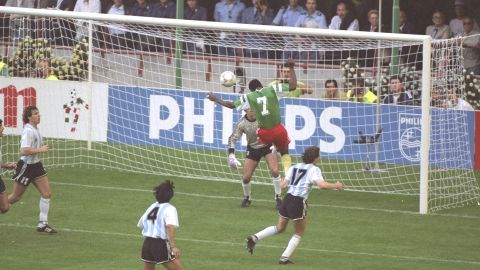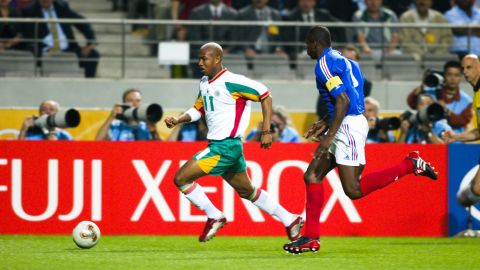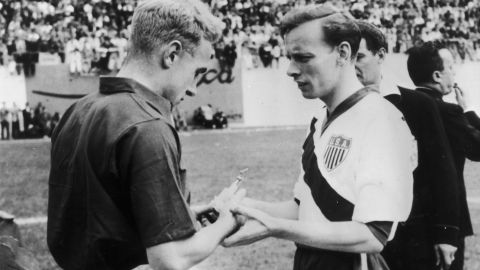
CNN
—
Argentina has won the World Cup twice – in 1978 and 1986 – but at Qatar 2022 La Albiceleste wrote its name into the history books in an altogether different way.
According to sports data group Gracenote, Argentina’s 2-1 defeat by Saudi Arabia in their Group C match is the biggest upset in World Cup history.
Led by Lionel Messi, ranked third in the world, unbeaten for three years and among the favorites to win the 2022 tournament, many had expected Argentina to sweep aside Saudi Arabia with 48 places separating the two teams in the world rankings.
All the pre-match talk focused on Messi, one of the world’s greatest ever players who is likely playing his last World Cup.
The Argentina captain scored an early penalty to put his side in the lead, but two second-half goals from Saleh Al-Shehri and Salem Al Dawsari turned the game on its head.
Al Dawsari’s incredible winner from distance – and subsequent acrobatic celebration – will become one of the moments of this – or any – World Cup, and undoubtedly, in time, an “I-was-there” moment for fans.
According to Gracenote, the previous most surprising World Cup win was USA’s victory against England in 1950, in which the American team had a 9.5% chance of victory.
But Saudi Arabia’s chance of victory on Tuesday was estimated at 8.7%, which means the Green Falcons take over the number one spot.
Gracenote said it uses the company’s “proprietary football ranking system to identify the most shocking upsets over the course of the World Cup’s storied 92 years.”
But what have been some of the World Cup’s other big upsets?

Diego Maradona had taken the world by storm at the 1986 World Cup, delivering a succession of spectacular individual performances as Argentina claimed its secondd title.
Four years later, the tournament was hosted by Italy and Maradona came into the World Cup having led Italian club Napoli to an iconic Serie A title.
Argentina’s opponent in Italia 90’s opening match was a Cameroon team that had been knocked out of that year’s Africa Cup of Nations in the group stages and had recently recalled a then-38-year-old Roger Milla, who hadn’t played for the Indomitable Lions for three years.
Cameroon didn’t let Maradona play, practically fouling him every time the Argentine magician touched the ball – so much so that the African team ended the game with nine players.
However, a second-half header from Francois Omam-Biyik was enough to earn Cameroon a famous victory.

France won the World Cup on home soil in 1998, beating Brazil 3-0 in the final, then won Euro 2000 two years later and was a strong favorite to retain its world title in South Korea and Japan.
France’s first game was against a Senegal team making its debut at the World Cup.
The former French colony was clearly up for the match. With iconic players such as El Hadji Diouf, Khalilou Fadiga and current Teranga Lions head coach Aliou Cisse, Senegal went for the throat of its much-fancied opponent.
Diouf produced a spectacular performance, but it was the unheralded Papa Bouba Diop who scrambled home the only goal of the game to secure a stunning victory for Senegal.
Things went from bad to worse for France as the defending champion failed to reach the knockout stages, finishing bottom of its group.

Another African nation making its debut, Algeria, took on West Germany in a group that would change the World Cup forever.
West Germany came into the game as one of the tournament favorites having won every single qualifying match. The team was so confident that manager Jupp Derwall said he would “jump on the first train back to Munich” in the event of a defeat.
That arrogance came back to haunt Derwall as a completely unknown Algeria team outplayed West Germany.
The North Africans took the lead in the 54th minute through Rabah Madjer, before Karl-Heinz Rummenigge leveled 13 minutes later. But straight from the kickoff, Algeria went up the other end of the pitch to retake the lead.
Despite the famous victory, Algeria would not make it out of the group, in part because West Germany secured a 1-0 win against Austria – a result that put both European sides through to the next round at the expense of Algeria.
Ever since the “Disgrace of Gijón,” the final group matches at the World Cup have been played simultaneously.

Ahead of the 1950 World Cup in Brazil, football had been fully professional in England for decades, though this was the English team’s first appearance at a World Cup having chosen not to appear in the previous three tournaments.
England was up against a US team comprising semi-professional and amateur players including a grave digger, a dish washer and a postman.
But those amateurs pulled off the first great World Cup upset as Joe Gaetjens’ glancing header near the end of the first half was enough to secure a remarkable win for the US.
